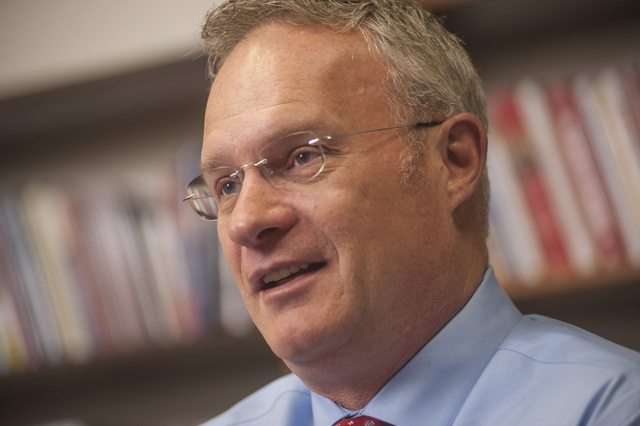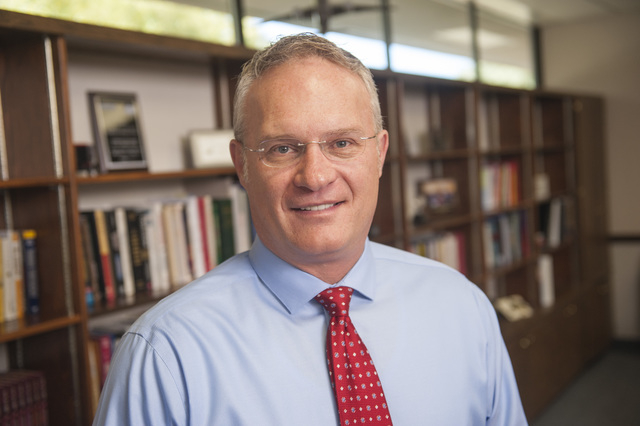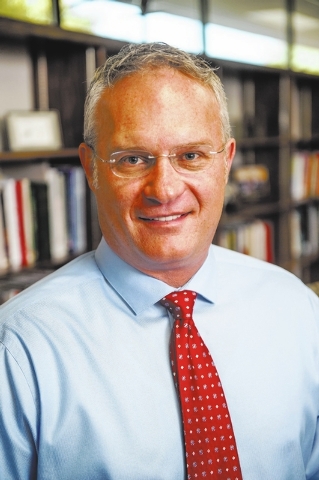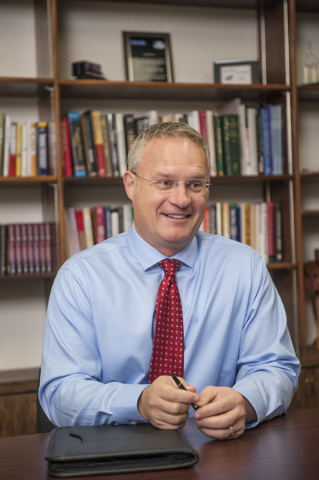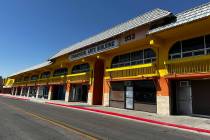Nevadan at Work: Dean wants stronger ties with business community
With several new deans taking over colleges at the University of Nevada, Las Vegas, it can be hard to tell the players without a scorecard. Even UNLV President Neil Smatresk has stepped down.
Despite Smatresk’s decision to leave UNLV to take over as president of the University of North Texas, Brent Hathaway said he is looking forward to what 2014 has to offer the 3,200 students enrolled in the Lee School of Business.
Hathaway said it was an easy decision to accept the job he started on Oct. 1.
“Fifty years ago, my family moved here,” Hathaway said. “My brother was born here. I was born in Rigby, Idaho, but my earliest memories are all about Las Vegas. We used to ride our bicycles right off the Strip.”
Hathaway had been dean of the University of Wyoming’s College of Business since 2004 before Smatresk recruited him to Las Vegas. At Wyoming, Hathaway co-founded the Wyoming Business Leadership Institute to support business expansion.
He also launched an executive MBA program and helped raise $50 million for facility improvements.
“I view my role as not only an ambassador for the business school, but as a partner with the business community,” Hathaway said.
Hathaway said fundraising is an important part of any dean’s role, and it “has become more and more important over time.” But, he added, it’s “just a byproduct of building those strong relationships.”
Hathaway hopes to build stronger connections with the Las Vegas business community, position the school to better prepare students and strengthen partnerships with outside entities. He is also pushing to build better relations with other UNLV schools.
“Culturally, this is a young institution,” Hathaway said. “My family moved here shortly after it had its birth. For a long time UNLV was known as just a teachers college. Students were told to apply here as a safe bet.”
Hathaway said those days are behind UNLV.
“(The) reputation of the school far outweighs the awareness locally and within the state about where UNLV is,” he said.
“I had a chance to serve 12 years at Wyoming,” he said. “We accomplished some bold priorities. It was time to challenge myself at a new institution. Given my experience in business and academia, UNLV is an attractive opportunity.”
Question: As a student who paid his way through college, how important is keeping education affordable?
Answer: For me, a state school has a responsibility to be mindful of access. Access for state’s general population who are preparing to attend college, and financial access. Those are the two dimensions of access that are important to me. It was important to me as I considered a career in higher education.
Question: Why leave a successful private sector career for academia?
Answer: Later in my career … I felt less and less fulfilled with the success that we were having in the business sector. There was a bit of a disconnect for me, because for some reason the more success we had in the business unit I was serving the less fulfilling it became. While it was a little troubling, I think I began to figure out that I had a calling somewhere else and that started the thought process that led me to higher education.
Question: What was your last private sector job?
Answer: Vice president of aerospace services for Honeywell International. I was with Allied Signal when we bought Honeywell.
Question: When you decide to change careers, how do you make that move?
Answer: I really just looked in the Chronicle of Higher Education and thought how could I take this blend of business experience … and have that resonate in higher education. So I looked at the Chronicle and the University of Wyoming was looking for a department chair in management marketing. They specifically said they were excited about individuals with tangible real-work experience. That was part of what drew me to apply.
Question: What do you remember from that experience?
Answer: I remember kind of crafting a résumé and sending it to the email on the posting, remembering that I don’t know what type of reception I would receive. But, I told them about my background and asked if they could just give me some feedback on my application materials I would appreciate it. It was one of those soft-sends. The response I got back from the dean at the time was. “Brent, I love your résumé, don’t send it to anybody else and I’ll call you tonight.” That started the process (and) I joined the University of Wyoming in 2001.
Question: What was the goal of the Wyoming Business Leadership Institute?
Answer: The goal was to assist people in Wyoming, especially those in the small-business community who may have pursued an education in something other than business only to later on find themselves through circumstances back in a small family business. So the goal was to provide some of the core skill-sets around accounting, finances and human resources. The basics. There was a real need there. The goal was to offer short courses that would be available to anyone in Wyoming.
Question: Is there a need for a similar program in Las Vegas?
Answer: I think we do have opportunities (here) to ask broader questions of the business community. But, I’ll continue to ask them if there is a need in the business community that the business school can fill. We are just starting the strategic planning process. Some of the questions we’ll ask will deal with curriculum, programming and how do we better serve the Southern Nevada community.
Question: The business school offers courses with real-world experience. I take it that’s an important part of a student’s education?
Answer: I think you hit it on the head. We’ve got a couple of real assets in the business school. One of them is how we deal with the whole idea of venture capital and entrepreneurship curriculum. We are giving students the opportunity to make real investments in companies with real dollars. That doesn’t occur everywhere. It is just really unusual to have students making real-world investments. The Rebel Venture Fund is not a case study or a textbook.
Question: How does the Lee Business School support economic development?
Answer: We have a number of roles. But the primary role is to supply the next generation of business leaders. That’s just a very important role. But it also goes back to some of our other programs. We have an executive MBA program. That program is doing well … taking people in an organization who might have an engineering degree or a history degree who are now finding themselves stepping forward in a leadership role. Where an executive MBA is perfect for them. So there is a perfect example of a program that was crafted for the community.
Question: UNLV’s law school is the only one in Nevada, but you face competition for students from University of Nevada, Reno’s College of Business. Does that present any challenges?
Answer: I considered UNR’s business school to be a key collaborator with us. I think my view is I already have a strong relationship with (UNR business) Dean Gregory Mosier.
We’ve already had several conversations on how we can better partner on things. So I consider them a sister school and we’ll find ways to work together.
Contact reporter Chris Sieroty at csieroty@reviewjournal.com or 702-477-3893. Follow @sierotyfeatures on Twitter.



